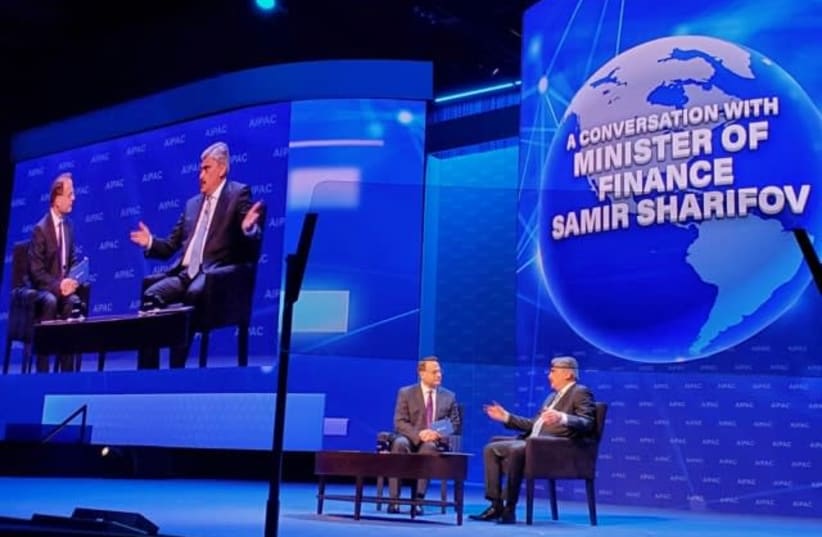While the usual discussions of the Israel-PLO peace process and bipartisan support for Israel played out, one key takeaway that was not front and center in the media coverage was how this American organization is playing a role in international pro-Israel advocacy.
The packed event attracted 18,000 people, including 4,000 students. Among them, however, were presidents from the Democratic Republic of the Congo, Columbia, Estonia and Serbia. There was also a cabinet-level minister from a Shi’ite majority state Azerbaijan.
Samir Sharifov, the finance minister of Azerbaijan, told thousands of AIPAC members that, “Cooperation with Israel is not limited to oil supply, we are interested in widening cooperation in defense and transfer of technology. “
For a minister from a country that borders Iran, Turkey and Russia, Sharifov’s appearance was no small matter. To capture the significance of Sharifov’s visit, he also read a letter from First Vice-President of Azerbaijan, Mehriban Aliyeva, addressed to the AIPAC attendees.
Serbia’s president Aleksandar Vucic not only stressed the intertwined histories of Serbian Jews and Serbs in the Balkans but used the AIPAC conference to announce a large military purchase from Israel.
Vucic declared that Serbia will open a diplomatic presence in Jerusalem, as well as a chamber of commerce. The state office in Jerusalem was widely viewed as a step toward re-locating Serbia’s embassy to Israel’s capital.
European countries take notice of such moves.
A source familiar with AIPAC told The Jerusalem Post that the “key message for AIPAC in having an international interface is virtually any issue that deals with the US-Israel relationship has an international touch point, be it the Iran nuclear issue, the campaign to isolate and delegitimize Israel, and international terrorism.”
AIPAC’s international connections can help stymie the Boycott, Divestment and Sanctions (BDS) campaign targeting Israel and work to pressure Iran to abandon its nuclear weapons program and terrorism.
The source said that the “International focus brings value added to the US-Israel relationship. Having a member of the United Nations Security Council, like Estonia, speak at the AIPAC Policy Conference is significant. It sends an important signal of helping grow and solidify the troika of relations among the US, Israel and Estonia.”
He added that AIPAC “has fostered trilateral relationships. People recognize AIPAC is the center of the pro-Israel world and influence and want to seek out relationships with AIPAC.”
Another example: The president of the Democratic Republic of the Congo (DRC), Félix Tshisekedi, addressed the AIPAC event. Tshisekedi declared the DRC will send an ambassador to Israel after a 20-year rupture. The DRC is a mineral-rich country that covers the second largest land mass on the African continent.
Last year, the president of Mongolia visited AIPAC’s office—another strategically important country.
AIPAC took many of its major donors (about 100 people) in 2018 to five countries in Europe. The organization spent an hour with German Chancellor Angela Merkel. The agenda ranged from Iran to voting patterns in international forums. Prior to the start of AIPAC’s policy conference, the organization hosted an international security forum with more than 30 countries from Latin America, Europe, Africa and Asia.
These kinds of trilateral meetings between international, American and Israelis could and should continue to have impact on the Jewish state in the coming years.
